Roberts A.D. The Cambridge History of Africa, Volume 7: from 1905 to 1940
Подождите немного. Документ загружается.

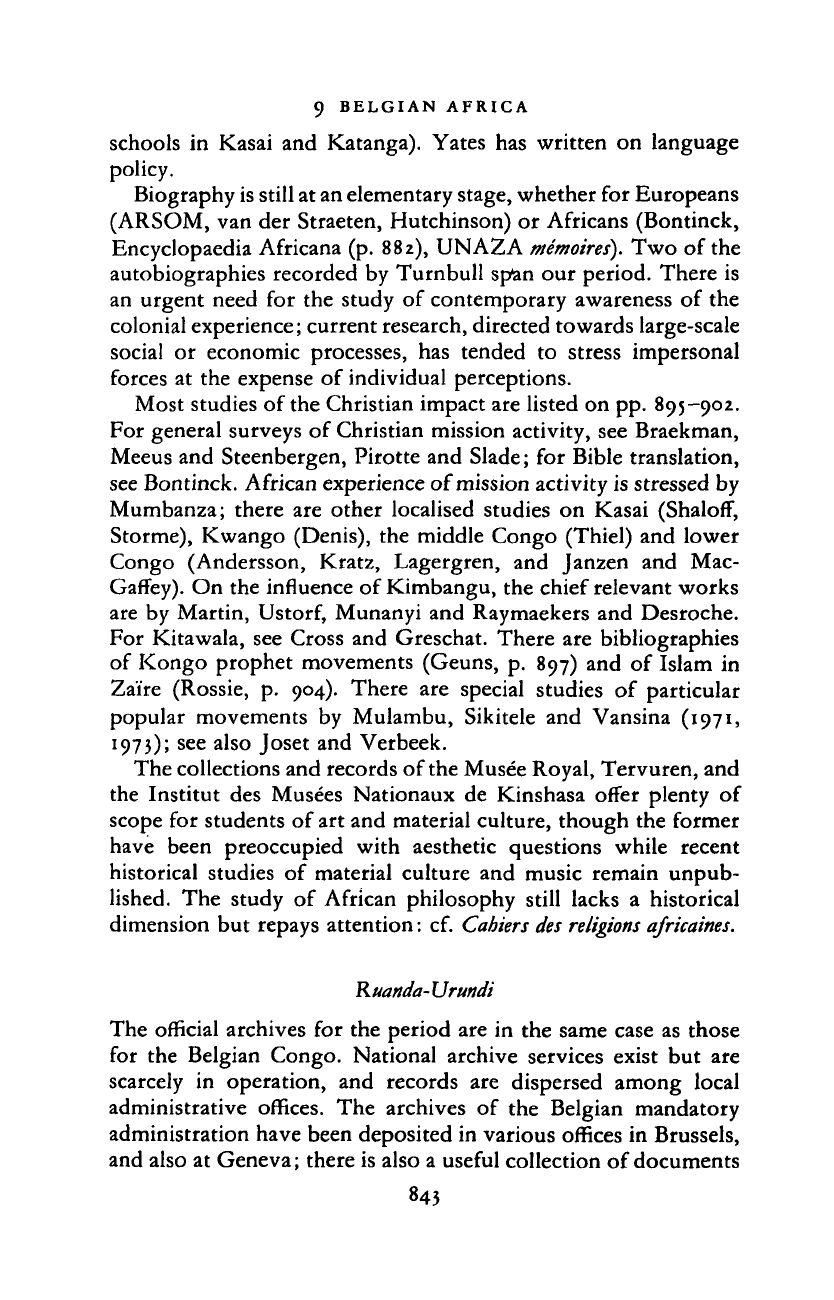
9 BELGIAN AFRICA
schools in Kasai and Katanga). Yates has written on language
policy.
Biography is still at an elementary stage, whether for Europeans
(ARSOM, van der Straeten, Hutchinson) or Africans (Bontinck,
Encyclopaedia Africana (p. 882), UNAZA
me'moires).
Two of the
autobiographies recorded by Turnbull span our period. There is
an urgent need for the study of contemporary awareness of the
colonial experience; current research, directed towards large-scale
social or economic processes, has tended to stress impersonal
forces at the expense of individual perceptions.
Most studies of the Christian impact are listed on pp. 895-902.
For general surveys of Christian mission activity, see Braekman,
Meeus and Steenbergen, Pirotte and Slade; for Bible translation,
see Bontinck. African experience of mission activity is stressed by
Mumbanza; there are other localised studies on Kasai
(Shaloff,
Storme), Kwango (Denis), the middle Congo (Thiel) and lower
Congo (Andersson, Kratz, Lagergren, and Janzen and Mac-
Gaffey). On the influence of Kimbangu, the chief relevant works
are by Martin,
Ustorf,
Munanyi and Raymaekers and Desroche.
For Kitawala, see Cross and Greschat. There are bibliographies
of Kongo prophet movements (Geuns, p. 897) and of Islam in
Zaire (Rossie, p. 904). There are special studies of particular
popular movements by Mulambu, Sikitele and Vansina
(1971,
1973);
see also Joset and Verbeek.
The collections and records of the Musee Royal, Tervuren, and
the Institut des Musees Nationaux de Kinshasa offer plenty of
scope for students of art and material culture, though the former
have been preoccupied with aesthetic questions while recent
historical studies of material culture and music remain unpub-
lished. The study of African philosophy still lacks a historical
dimension but repays attention: cf.
Cahiers des religions
ajricaines.
Ruanda- Urundi
The official archives for the period are in the same case as those
for the Belgian Congo. National archive services exist but are
scarcely in operation, and records are dispersed among local
administrative offices. The archives of the Belgian mandatory
administration have been deposited in various offices in Brussels,
and also at Geneva; there is also a useful collection of documents
843
Cambridge Histories Online © Cambridge University Press, 2008
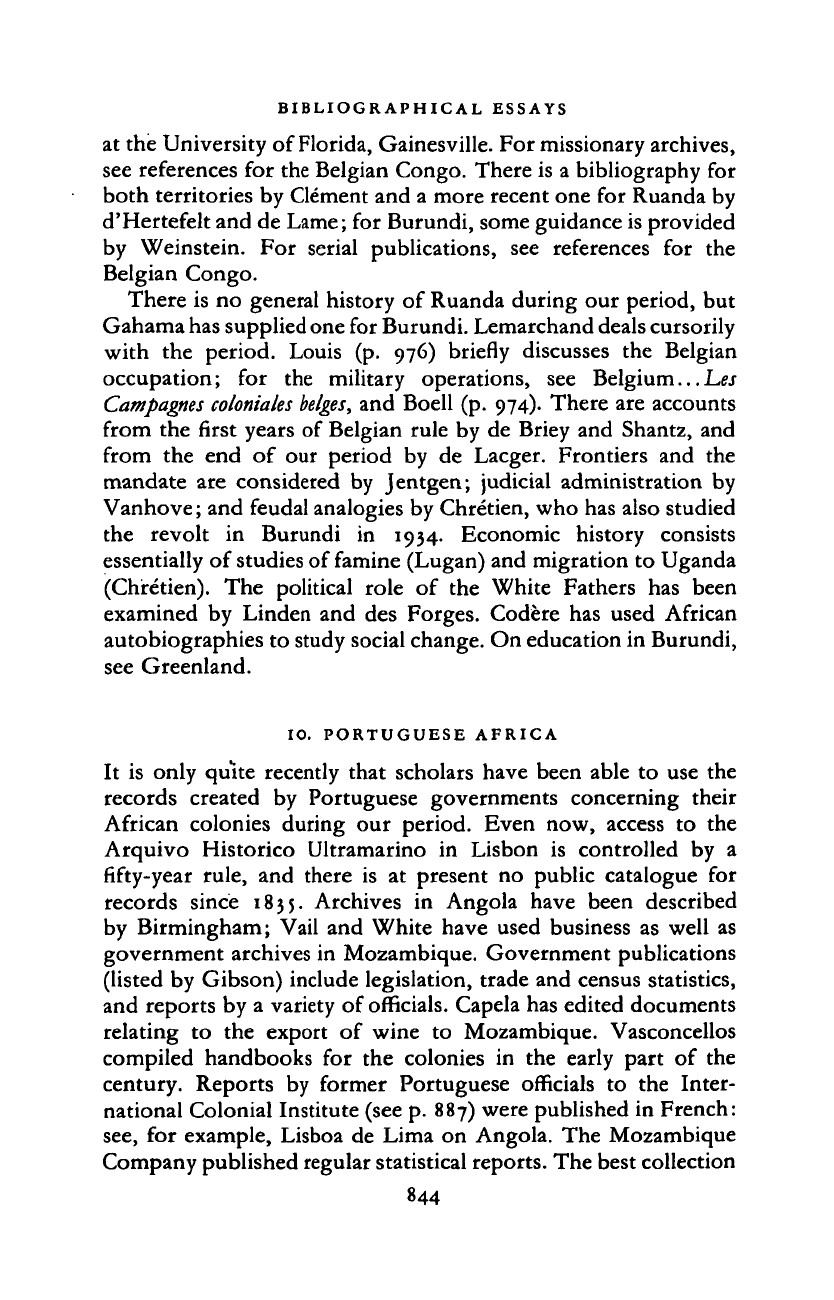
BIBLIOGRAPHICAL ESSAYS
at the University of Florida, Gainesville. For missionary archives,
see references for the Belgian Congo. There is a bibliography for
both territories by Clement and a more recent one for Ruanda by
d'Hertefelt and de Lame; for Burundi, some guidance is provided
by Weinstein. For serial publications,
see
references
for the
Belgian Congo.
There is no general history of Ruanda during our period, but
Gahama has supplied one for Burundi. Lemarchand deals cursorily
with
the
period. Louis
(p.
976) briefly discusses
the
Belgian
occupation;
for the
military operations,
see
Belgium... Les
Campagnes coloniales
beiges,
and Boell (p. 974). There are accounts
from the first years of Belgian rule by de Briey and Shantz, and
from the end
of
our period
by de
Lacger. Frontiers and
the
mandate are considered by Jentgen; judicial administration by
Vanhove; and feudal analogies by Chretien, who has also studied
the revolt
in
Burundi
in
1934. Economic history consists
essentially of studies of famine (Lugan) and migration to Uganda
(Chretien). The political role
of
the White Fathers has been
examined by Linden and des Forges. Codere has used African
autobiographies to study social change. On education in Burundi,
see Greenland.
10.
PORTUGUESE AFRICA
It
is
only quite recently that scholars have been able to use the
records created
by
Portuguese governments concerning their
African colonies during our period. Even now, access
to
the
Arquivo Historico Ultramarino
in
Lisbon
is
controlled
by a
fifty-year
rule,
and there
is at
present no public catalogue
for
records since 1835. Archives
in
Angola have been described
by Birmingham; Vail and White have used business as well as
government archives in Mozambique. Government publications
(listed by Gibson) include legislation, trade and census statistics,
and reports by a variety of officials. Capela has edited documents
relating
to
the export
of
wine
to
Mozambique. Vasconcellos
compiled handbooks
for
the colonies
in
the early part
of
the
century. Reports
by
former Portuguese officials
to
the Inter-
national Colonial Institute (see p. 887) were published in French:
see,
for example, Lisboa de Lima on Angola. The Mozambique
Company published regular statistical reports. The best collection
844
Cambridge Histories Online © Cambridge University Press, 2008
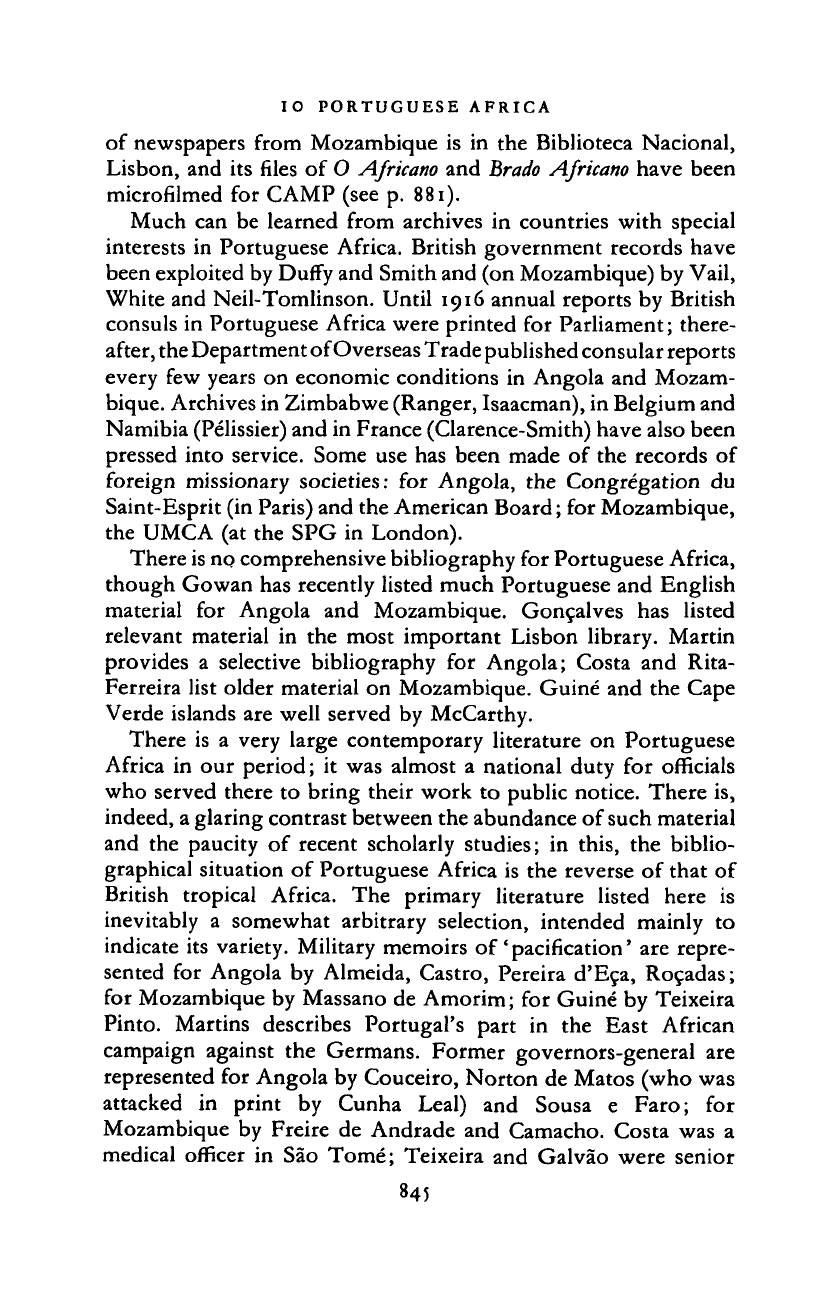
IO PORTUGUESE AFRICA
of newspapers from Mozambique is in the Biblioteca Nacional,
Lisbon, and its files of O Ajricano and
Brado
Ajricano have been
microfilmed for CAMP (see p. 881).
Much can be learned from archives in countries with special
interests in Portuguese Africa. British government records have
been exploited by Duffy and Smith and (on Mozambique) by Vail,
White and Neil-Tomlinson. Until 1916 annual reports by British
consuls in Portuguese Africa were printed for Parliament; there-
after, the Department of Overseas Trade published consular reports
every few years on economic conditions in Angola and Mozam-
bique. Archives in Zimbabwe (Ranger, Isaacman), in Belgium and
Namibia (Pelissier) and in France (Clarence-Smith) have also been
pressed into service. Some use has been made of the records of
foreign missionary societies: for Angola, the Congregation du
Saint-Esprit (in Paris) and the American Board; for Mozambique,
the UMCA (at the SPG in London).
There is no comprehensive bibliography for Portuguese Africa,
though Gowan has recently listed much Portuguese and English
material for Angola and Mozambique. Goncalves has listed
relevant material in the most important Lisbon library. Martin
provides a selective bibliography for Angola; Costa and Rita-
Ferreira list older material on Mozambique. Guine and the Cape
Verde islands are well served by McCarthy.
There is a very large contemporary literature on Portuguese
Africa in our period; it was almost a national duty for officials
who served there to bring their work to public notice. There is,
indeed, a glaring contrast between the abundance of such material
and the paucity of recent scholarly studies; in this, the biblio-
graphical situation of Portuguese Africa is the reverse of that of
British tropical Africa. The primary literature listed here is
inevitably a somewhat arbitrary selection, intended mainly to
indicate its variety. Military memoirs of' pacification' are repre-
sented for Angola by Almeida, Castro, Pereira
d'Eca,
Rocadas;
for Mozambique by Massano de Amorim; for Guine by Teixeira
Pinto.
Martins describes Portugal's part in the East African
campaign against the Germans. Former governors-general are
represented for Angola by Couceiro, Norton de Matos (who was
attacked in print by Cunha Leal) and Sousa e Faro; for
Mozambique by Freire de Andrade and Camacho. Costa was a
medical officer in Sao Tome; Teixeira and Galvao were senior
845
Cambridge Histories Online © Cambridge University Press, 2008
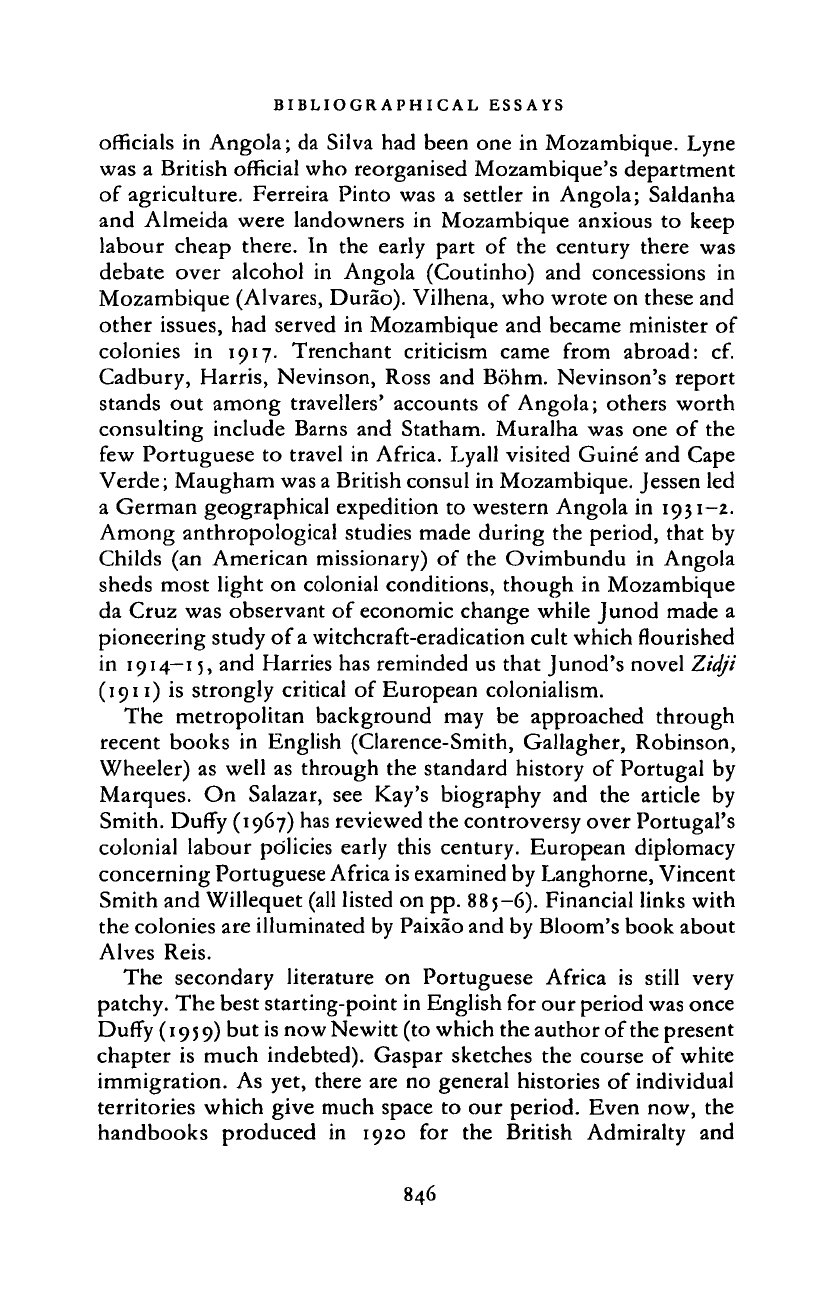
BIBLIOGRAPHICAL ESSAYS
officials in Angola; da Silva had been one in Mozambique. Lyne
was a British official who reorganised Mozambique's department
of agriculture. Ferreira Pinto was
a
settler
in
Angola; Saldanha
and Almeida were landowners in Mozambique anxious
to
keep
labour cheap there.
In
the early part
of
the century there was
debate over alcohol
in
Angola (Coutinho) and concessions
in
Mozambique (Alvares, Durao). Vilhena, who wrote on these and
other issues, had served in Mozambique and became minister of
colonies
in
1917. Trenchant criticism came from abroad:
cf.
Cadbury, Harris, Nevinson, Ross and Bohm. Nevinson's report
stands out among travellers' accounts
of
Angola; others worth
consulting include Barns and Statham. Muralha was one of the
few Portuguese to travel in Africa. Lyall visited Guine and Cape
Verde; Maugham was
a
British consul in Mozambique. Jessen led
a German geographical expedition to western Angola in 1931-2.
Among anthropological studies made during the period, that by
Childs (an American missionary)
of
the Ovimbundu
in
Angola
sheds most light on colonial conditions, though in Mozambique
da Cruz was observant of economic change while Junod made
a
pioneering study of a witchcraft-eradication cult which flourished
in 1914—15, and Harries has reminded us that Junod's novel Zidji
(1911) is strongly critical of European colonialism.
The metropolitan background may
be
approached through
recent books
in
English (Clarence-Smith, Gallagher, Robinson,
Wheeler) as well as through the standard history of Portugal by
Marques.
On
Salazar, see Kay's biography and the article
by
Smith. Duffy (1967) has reviewed the controversy over Portugal's
colonial labour policies early this century. European diplomacy
concerning Portuguese Africa is examined by Langhorne, Vincent
Smith and Willequet (all listed on pp. 885-6). Financial links with
the colonies are illuminated by Paixao and by Bloom's book about
Alves Reis.
The secondary literature
on
Portuguese Africa
is
still very
patchy. The best starting-point in English for our period was once
Duffy (1959) but is now Newitt (to which the author of the present
chapter is much indebted). Gaspar sketches the course of white
immigration. As yet, there are no general histories of individual
territories which give much space to our period. Even now, the
handbooks produced
in
1920
for the
British Admiralty
and
846
Cambridge Histories Online © Cambridge University Press, 2008
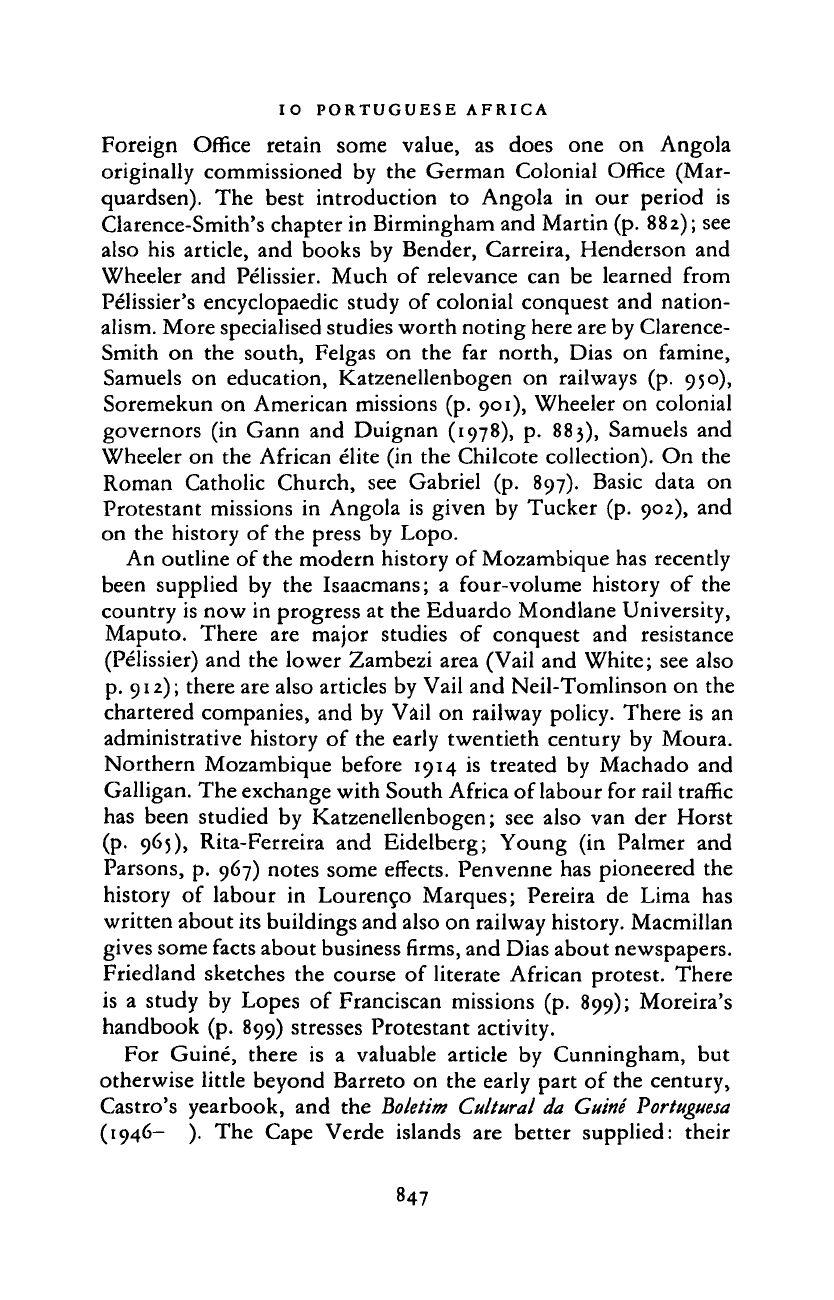
IO PORTUGUESE AFRICA
Foreign Office retain some value,
as
does
one on
Angola
originally commissioned
by
the German Colonial Office (Mar-
quardsen). The best introduction
to
Angola
in our
period
is
Clarence-Smith's chapter in Birmingham and Martin (p. 882); see
also his article, and books by Bender, Carreira, Henderson and
Wheeler and Pelissier. Much
of
relevance can
be
learned from
Pelissier's encyclopaedic study
of
colonial conquest and nation-
alism. More specialised studies worth noting here are by Clarence-
Smith
on
the south, Felgas
on
the
far
north, Dias
on
famine,
Samuels
on
education, Katzenellenbogen
on
railways (p. 950),
Soremekun on American missions (p. 901), Wheeler on colonial
governors (in Gann and Duignan (1978), p. 883), Samuels and
Wheeler on the African elite (in the Chilcote collection). On the
Roman Catholic Church,
see
Gabriel
(p.
897). Basic data
on
Protestant missions
in
Angola is given by Tucker (p. 902), and
on the history of the press by Lopo.
An outline of the modern history of Mozambique has recently
been supplied
by
the Isaacmans;
a
four-volume history
of
the
country is now in progress at the Eduardo Mondlane University,
Maputo. There
are
major studies
of
conquest
and
resistance
(Pelissier) and the lower Zambezi area (Vail and White; see also
p.
912); there are also articles by Vail and Neil-Tomlinson on the
chartered companies, and by Vail on railway policy. There is an
administrative history
of
the early twentieth century by Moura.
Northern Mozambique before 1914
is
treated by Machado and
Galligan. The exchange with South Africa of labour for rail traffic
has been studied
by
Katzenellenbogen; see also van der Horst
(p.
965), Rita-Ferreira and Eidelberg; Young
(in
Palmer and
Parsons, p. 967) notes some effects. Penvenne has pioneered the
history
of
labour
in
Lourenco Marques; Pereira
de
Lima
has
written about its buildings and also on railway history. Macmillan
gives some facts about business firms, and Dias about newspapers.
Friedland sketches the course
of
literate African protest. There
is
a
study by Lopes
of
Franciscan missions (p. 899); Moreira's
handbook (p. 899) stresses Protestant activity.
For Guine, there
is a
valuable article
by
Cunningham,
but
otherwise little beyond Barreto on the early part of the century,
Castro's yearbook,
and the
Boletim Cultural da Guine Portuguesa
(1946-
).
The Cape Verde islands
are
better supplied: their
847
Cambridge Histories Online © Cambridge University Press, 2008
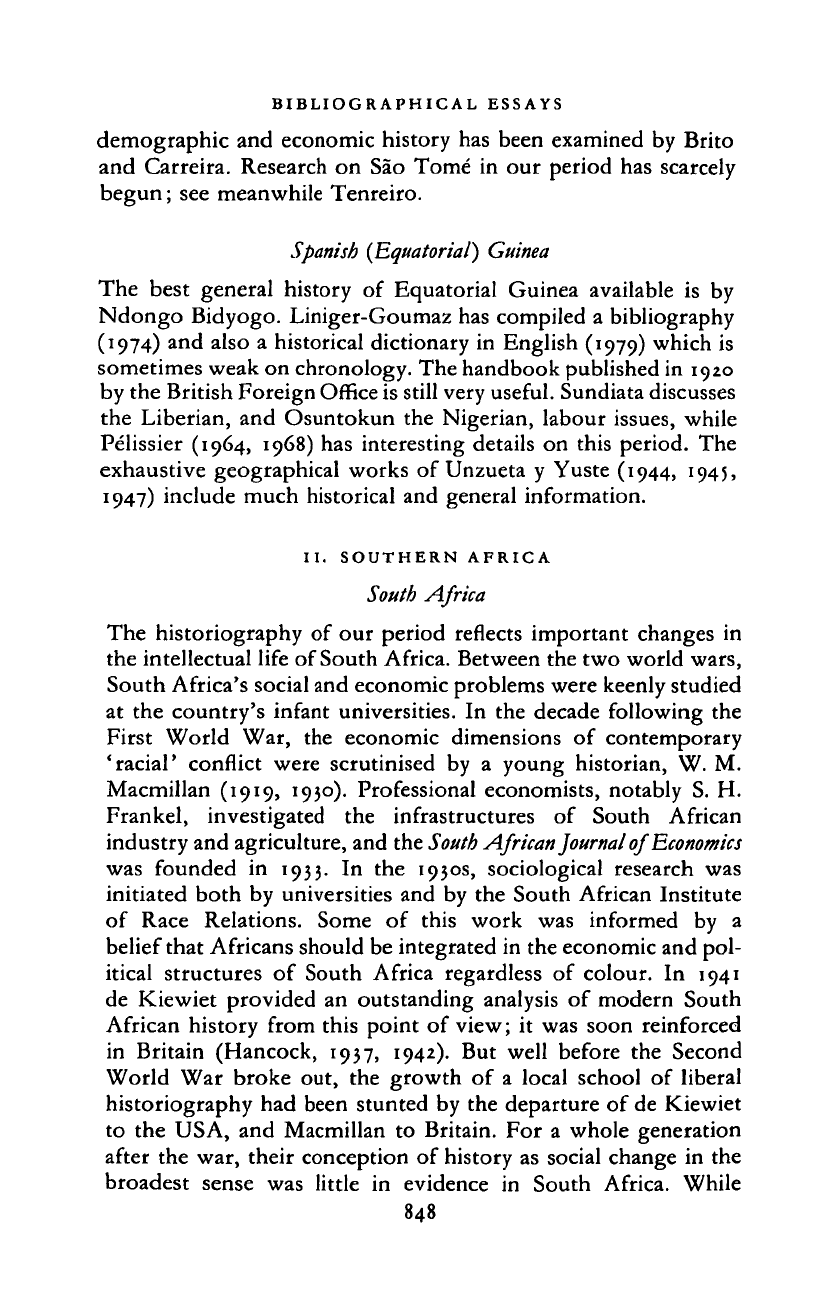
BIBLIOGRAPHICAL ESSAYS
demographic and economic history has been examined by Brito
and Carreira. Research on Sao Tome in our period has scarcely
begun; see meanwhile Tenreiro.
Spanish (Equatorial) Guinea
The best general history
of
Equatorial Guinea available
is by
Ndongo Bidyogo. Liniger-Goumaz has compiled a bibliography
(1974) and also
a
historical dictionary in English (1979) which is
sometimes weak on chronology. The handbook published in 1920
by the British Foreign Office is still very useful. Sundiata discusses
the Liberian, and Osuntokun the Nigerian, labour issues, while
Pelissier (1964, 1968) has interesting details on this period. The
exhaustive geographical works of Unzueta y Yuste (1944, 1945,
1947) include much historical and general information.
II.
SOUTHERN AFRICA
South Africa
The historiography of our period reflects important changes
in
the intellectual life of South Africa. Between the two world wars,
South Africa's social and economic problems were keenly studied
at the country's infant universities.
In
the decade following the
First World War,
the
economic dimensions
of
contemporary
'racial' conflict were scrutinised
by a
young historian, W. M.
Macmillan (1919, 1930). Professional economists, notably S.
H.
Frankel, investigated
the
infrastructures
of
South African
industry and agriculture, and the South African Journal of Economics
was founded
in
193}.
In
the 1930s, sociological research was
initiated both by universities and by the South African Institute
of Race Relations. Some
of
this work
was
informed
by a
belief that Africans should be integrated in the economic and pol-
itical structures
of
South Africa regardless
of
colour.
In
1941
de Kiewiet provided an outstanding analysis
of
modern South
African history from this point of view;
it
was soon reinforced
in Britain (Hancock, 1937, 1942). But well before the Second
World War broke out, the growth
of
a local school
of
liberal
historiography had been stunted by the departure of de Kiewiet
to the USA, and Macmillan
to
Britain. For
a
whole generation
after the war, their conception of history as social change in the
broadest sense was little
in
evidence
in
South Africa. While
Cambridge Histories Online © Cambridge University Press, 2008
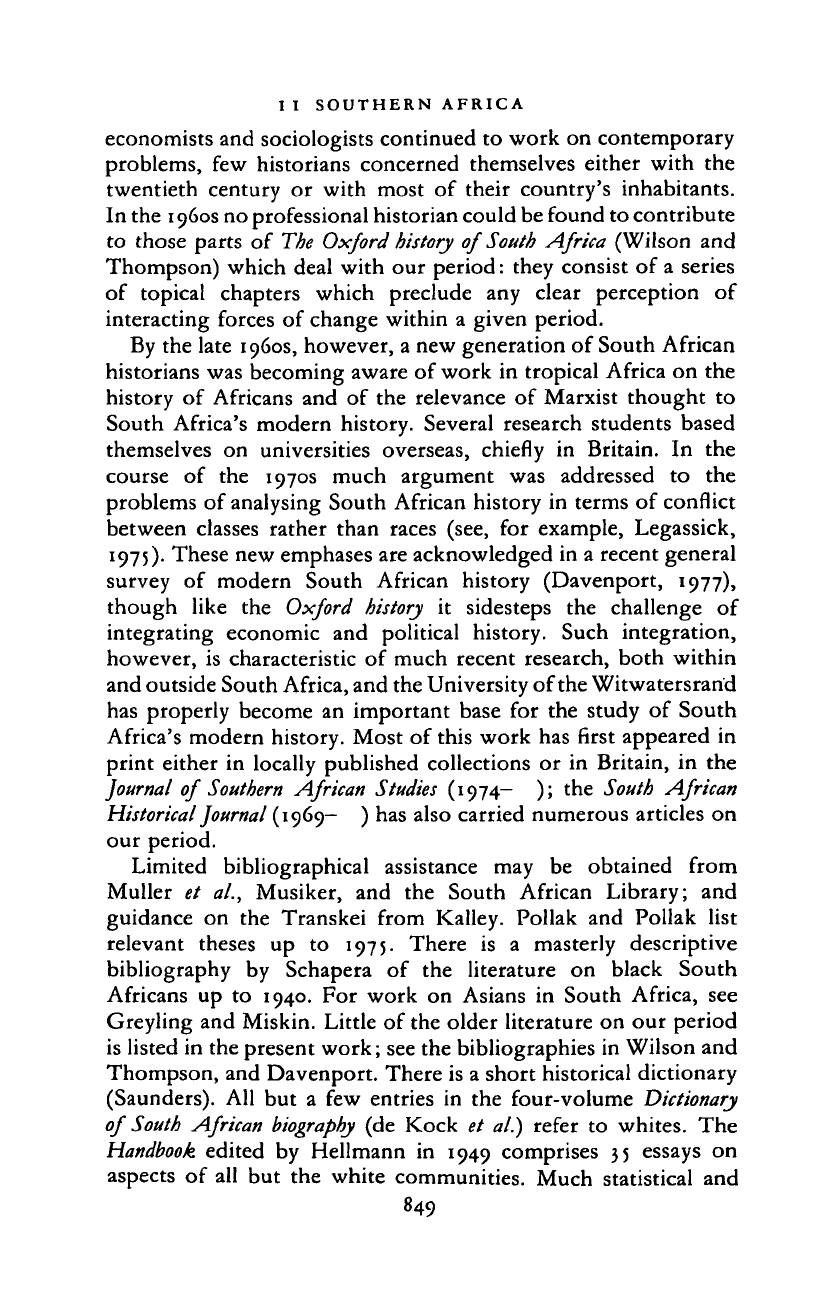
I I SOUTHERN AFRICA
economists and sociologists continued to work on contemporary
problems, few historians concerned themselves either with
the
twentieth century
or
with most
of
their country's inhabitants.
In the 1960s no professional historian could be found to contribute
to those parts
of
The Oxford
history
of
South
Africa (Wilson and
Thompson) which deal with our period: they consist of a series
of topical chapters which preclude
any
clear perception
of
interacting forces of change within
a
given period.
By the late 1960s, however, a new generation of South African
historians was becoming aware of work in tropical Africa on the
history
of
Africans and
of
the relevance
of
Marxist thought
to
South Africa's modern history. Several research students based
themselves
on
universities overseas, chiefly
in
Britain.
In the
course
of the
1970s much argument
was
addressed
to the
problems of analysing South African history in terms of conflict
between classes rather than races (see,
for
example, Legassick,
1975).
These new emphases are acknowledged in a recent general
survey
of
modern South African history (Davenport, 1977),
though like
the
Oxford history
it
sidesteps
the
challenge
of
integrating economic
and
political history. Such integration,
however,
is
characteristic
of
much recent research, both within
and outside South Africa, and the University of the Witwatersrand
has properly become an important base
for
the study
of
South
Africa's modern history. Most of this work has first appeared in
print either in locally published collections
or
in Britain,
in
the
Journal
of
Southern
African Studies (1974—
); the
South African
Historical
Journal
(1969—
)
has also carried numerous articles on
our period.
Limited bibliographical assistance
may be
obtained from
Muller
et
al., Musiker,
and the
South African Library;
and
guidance
on the
Transkei from Kalley. Pollak and Pollak list
relevant theses
up to
1975. There
is a
masterly descriptive
bibliography
by
Schapera
of the
literature
on
black South
Africans up
to
1940. For work
on
Asians
in
South Africa,
see
Greyling and Miskin. Little of the older literature on our period
is listed in the present work; see the bibliographies in Wilson and
Thompson, and Davenport. There is a short historical dictionary
(Saunders). All but
a
few entries
in
the four-volume
Dictionary
of
South
African
biography
(de Kock et al.) refer
to
whites. The
Handbook
edited
by
Hellmann
in
1949 comprises 35 essays
on
aspects
of
all but the white communities. Much statistical and
849
Cambridge Histories Online © Cambridge University Press, 2008
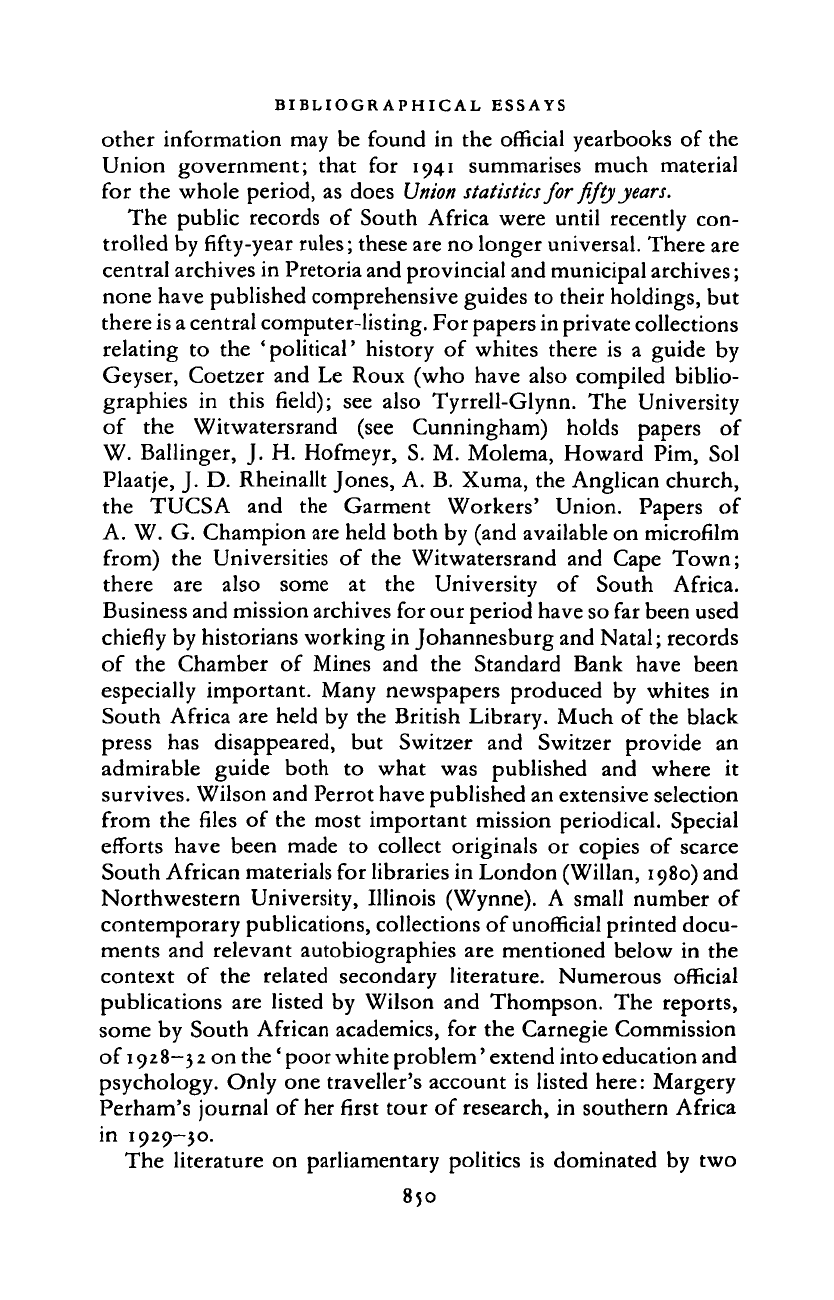
BIBLIOGRAPHICAL ESSAYS
other information may be found in the official yearbooks of the
Union government; that
for
1941 summarises much material
for the whole period, as does
Union
statistics for
fifty
years.
The public records
of
South Africa were until recently con-
trolled by fifty-year rules; these are no longer universal. There are
central archives in Pretoria and provincial and municipal archives;
none have published comprehensive guides to their holdings, but
there is a central computer-listing. For papers in private collections
relating
to
the 'political' history
of
whites there
is a
guide by
Geyser, Coetzer and Le Roux (who have also compiled biblio-
graphies
in
this field); see also Tyrrell-Glynn. The University
of
the
Witwatersrand
(see
Cunningham) holds papers
of
W. Ballinger,
J.
H. Hofmeyr, S. M. Molema, Howard Pirn, Sol
Plaatje, J. D. Rheinallt Jones, A. B. Xuma, the Anglican church,
the TUCSA
and the
Garment Workers' Union. Papers
of
A. W. G. Champion are held both by (and available on microfilm
from) the Universities
of
the Witwatersrand and Cape Town;
there
are
also some
at the
University
of
South Africa.
Business and mission archives for our period have so far been used
chiefly by historians working in Johannesburg and Natal; records
of the Chamber
of
Mines and
the
Standard Bank have been
especially important. Many newspapers produced by whites
in
South Africa are held by the British Library. Much of the black
press
has
disappeared,
but
Switzer
and
Switzer provide
an
admirable guide both
to
what
was
published
and
where
it
survives. Wilson and Perrot have published an extensive selection
from the files
of
the most important mission periodical. Special
efforts have been made
to
collect originals
or
copies
of
scarce
South African materials for libraries in London (Willan, 1980) and
Northwestern University, Illinois (Wynne).
A
small number of
contemporary publications, collections of unofficial printed docu-
ments and relevant autobiographies are mentioned below in the
context
of
the related secondary literature. Numerous official
publications are listed by Wilson and Thompson. The reports,
some by South African academics, for the Carnegie Commission
of
1928-3 2
on the' poor white problem' extend into education and
psychology. Only one traveller's account is listed here: Margery
Perham's journal of her first tour of research, in southern Africa
in 1929—30.
The literature on parliamentary politics
is
dominated by two
850
Cambridge Histories Online © Cambridge University Press, 2008
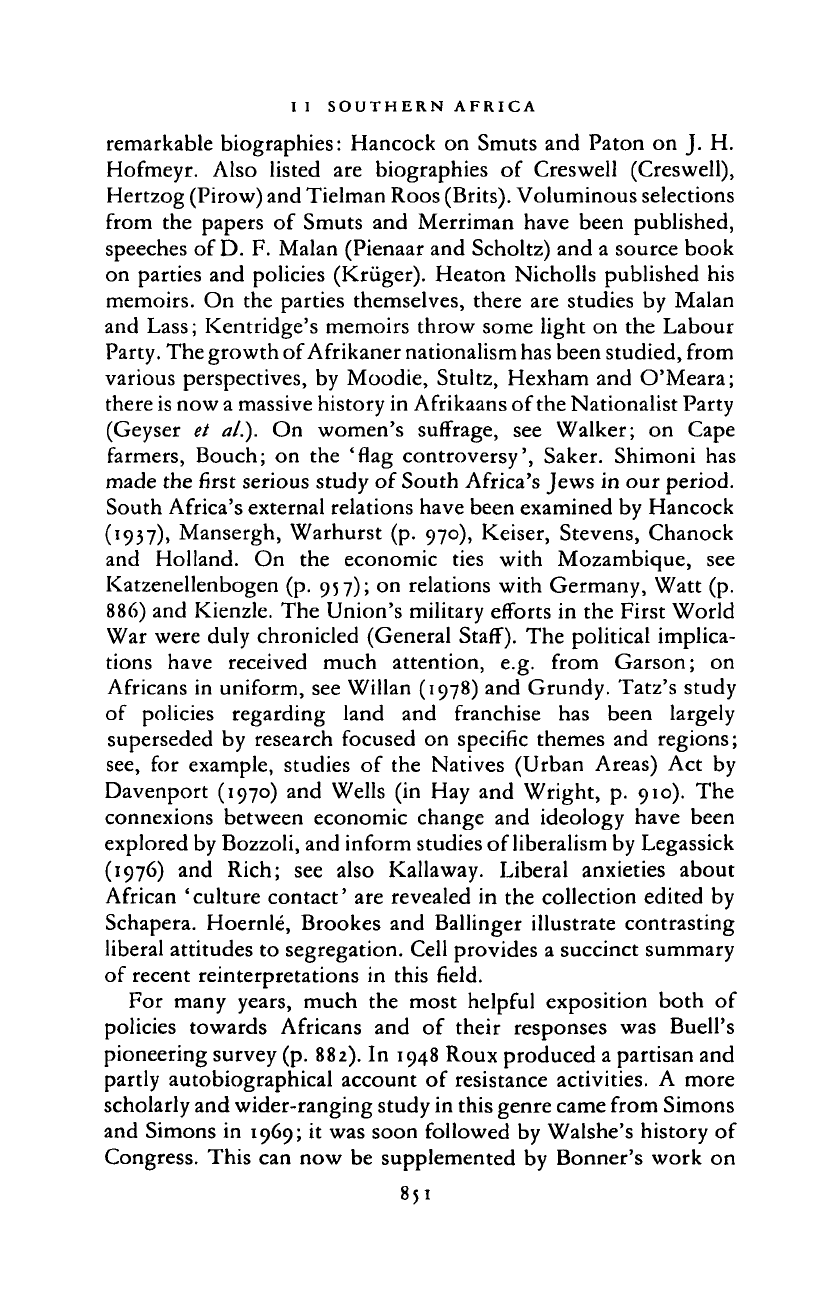
II SOUTHERN AFRICA
remarkable biographies: Hancock on Smuts and Paton on J. H.
Hofmeyr. Also listed
are
biographies
of
Creswell (Creswell),
Hertzog (Pirow) and Tielman Roos
(Brits).
Voluminous selections
from the papers
of
Smuts and Merriman have been published,
speeches of
D.
F. Malan (Pienaar and Scholtz) and a source book
on parties and policies (Kriiger). Heaton Nicholls published his
memoirs. On the parties themselves, there are studies by Malan
and Lass; Kentridge's memoirs throw some light on the Labour
Party. The growth of Afrikaner nationalism
has
been studied, from
various perspectives, by Moodie, Stultz, Hexham and O'Meara;
there is now
a
massive history in Afrikaans of the Nationalist Party
(Geyser
et
a/.).
On
women's suffrage,
see
Walker;
on
Cape
farmers, Bouch; on the 'flag controversy', Saker. Shimoni has
made the first serious study of South Africa's Jews in our period.
South Africa's external relations have been examined by Hancock
(1937),
Mansergh, Warhurst (p. 970), Keiser, Stevens, Chanock
and Holland.
On the
economic ties with Mozambique,
see
Katzenellenbogen (p. 957); on relations with Germany, Watt (p.
886) and Kienzle. The Union's military efforts in the First World
War were duly chronicled (General Staff). The political implica-
tions have received much attention,
e.g.
from Garson;
on
Africans in uniform, see Willan (1978) and Grundy. Tatz's study
of policies regarding land
and
franchise
has
been largely
superseded by research focused on specific themes and regions;
see,
for example, studies
of
the Natives (Urban Areas) Act by
Davenport (1970) and Wells (in Hay and Wright, p. 910). The
connexions between economic change and ideology have been
explored by Bozzoli, and inform studies of liberalism by Legassick
(1976)
and
Rich;
see
also Kallaway. Liberal anxieties about
African 'culture contact' are revealed in the collection edited by
Schapera. Hoernle, Brookes and Ballinger illustrate contrasting
liberal attitudes to segregation. Cell provides a succinct summary
of recent reinterpretations in this field.
For many years, much the most helpful exposition both
of
policies towards Africans and
of
their responses was Buell's
pioneering survey (p. 882). In 1948 Roux produced a partisan and
partly autobiographical account of resistance activities. A more
scholarly and wider-ranging study in this genre came from Simons
and Simons in 1969; it was soon followed by Walshe's history of
Congress. This can now be supplemented by Bonner's work on
851
Cambridge Histories Online © Cambridge University Press, 2008
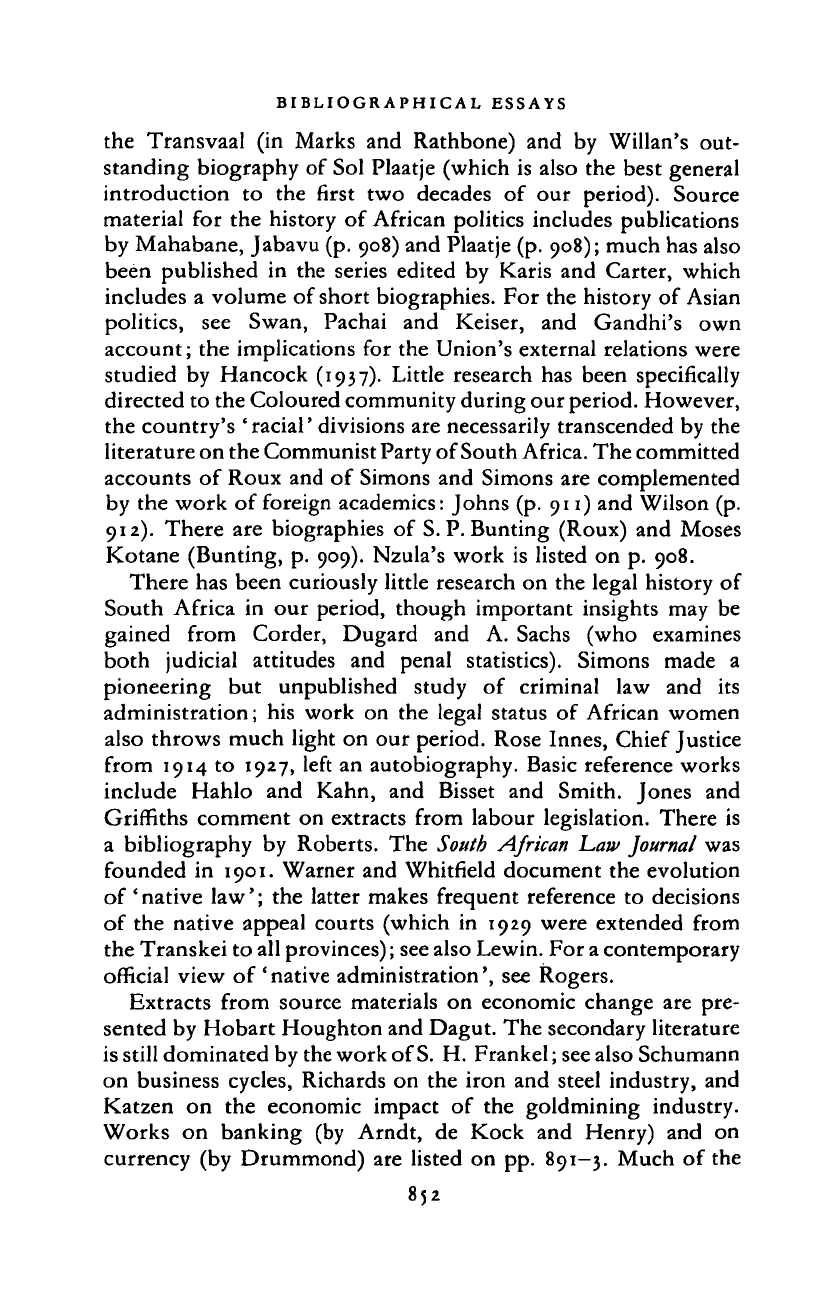
BIBLIOGRAPHICAL ESSAYS
the Transvaal (in Marks and Rathbone) and by Willan's out-
standing biography of Sol Plaatje (which is also the best general
introduction to the first two decades of our period). Source
material for the history of African politics includes publications
by Mahabane, Jabavu (p. 908) and Plaatje (p. 908); much has also
been published in the series edited by Karis and Carter, which
includes a volume of short biographies. For the history of Asian
politics, see Swan, Pachai and Keiser, and Gandhi's own
account; the implications for the Union's external relations were
studied by Hancock (1937). Little research has been specifically
directed to the Coloured community during our period. However,
the country's 'racial' divisions are necessarily transcended by the
literature on the Communist Party of South Africa. The committed
accounts of Roux and of Simons and Simons are complemented
by the work of foreign academics: Johns (p. 911) and Wilson (p.
912).
There are biographies of S. P. Bunting (Roux) and Moses
Kotane (Bunting, p. 909). Nzula's work is listed on p. 908.
There has been curiously little research on the legal history of
South Africa in our period, though important insights may be
gained from Corder, Dugard and A. Sachs (who examines
both judicial attitudes and penal statistics). Simons made a
pioneering but unpublished study of criminal law and its
administration; his work on the legal status of African women
also throws much light on our period. Rose Innes, Chief Justice
from 1914 to 1927, left an autobiography. Basic reference works
include Hahlo and Kahn, and Bisset and Smith. Jones and
Griffiths comment on extracts from labour legislation. There is
a bibliography by Roberts. The South African Law
Journal
was
founded in 1901. Warner and Whitfield document the evolution
of 'native law'; the latter makes frequent reference to decisions
of the native appeal courts (which in 1929 were extended from
the Transkei to all provinces); see also Lewin. For
a
contemporary
official view of'native administration', see Rogers.
Extracts from source materials on economic change are pre-
sented by Hobart Houghton and Dagut. The secondary literature
is still dominated by the work of S. H. Frankel; see also Schumann
on business cycles, Richards on the iron and steel industry, and
Katzen on the economic impact of the goldmining industry.
Works on banking (by Arndt, de Kock and Henry) and on
currency (by Drummond) are listed on pp.
891-3.
Much of the
852
Cambridge Histories Online © Cambridge University Press, 2008
